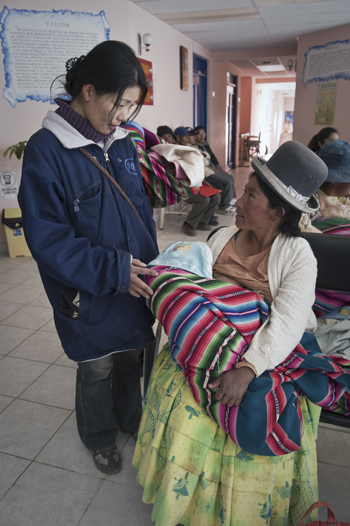
A JOCV nutritionist talking with an indigenous woman called a Cholita in Bolivia (photo: Japan International Cooperation Agency (JICA))
CHAPTER 4Japanese Diplomacy Open to the Public |
1. |
Strengthening the Foreign Policy Structure and Japanese Citizens Playing Active Roles Abroad |
In order to secure its national interests and properly address various challenges in the international community, Japan needs to strengthen its foreign policy structure, and to coordinate with various internationally active organizations, as well as to promote an “all-Japan” effective diplomacy.
To this end, it is necessary to make efficient and effective use of limited human and physical resources while securing a sufficient budget and human resources required for the diplomatic activities. Japan must also constantly revise its foreign policy implementation structure to respond appropriately to changes in the strategic environment that are being accelerated by the increasing international influence of emerging countries such as China, India, Brazil and South Africa, and to maintain and create an international order desirable for Japan.
From these perspectives, to optimize Japan’s foreign policy implementation structure, the Ministry of Foreign Affairs is promoting further rationalization and efficiency measures based on the results of budget screening and administrative work reviews. In this regard, the Ministry established a task force on Japan’s overseas establishments in June, which has conducted a review on the role of diplomatic missions. Consequently, it was announced that while continuing to review existing diplomatic establishments and to take cost-cutting measures, Japan will work to open new overseas establishments with the aim of developing its foreign policy implementation structure on a par with those of other major countries. For more efficient and effective human resource allocation, Japan will also reassign overseas diplomatic personnel to the countries where Japan needs to reinforce its foreign policy implementation structure, such as newly emerging economies, resource-producing countries, and countries where new diplomatic establishments has been opened.
The Japanese government is working to strengthen partnerships with Non-Governmental Organizations (NGOs) as important actors in international cooperation in efforts to develop “all-Japan” diplomacy. NGOs’ importance is growing in recent years as bodies providing assistance to developing countries in view of rising public interest in international cooperation. Japanese NGOs are implementing highly refined assistance attuned to local residents’ needs for carrying out poverty reduction and humanitarian assistance activities, primarily in Asia but also in other regions of the world including Africa and the Middle East. Based on their knowledge such as the present conditions of developing countries, NGOs are engaged in a wide range of activities in addition to on-site assistance, forming NGO networks and making policy recommendations in various fields like human rights, education, health, and the environment.
The Japan Overseas Cooperation Volunteers (JOCVs) and Senior Volunteers (SVs) are also important players in international cooperation, working toward the resolution of problems that developing countries face by striving together with local people. These volunteers’ activities are visible representation of Japan’s ODA in developing countries and widely appreciated around the world, playing significant roles in promoting economic and social development of those countries, and fostering mutual understanding and friendship between Japan and developing countries. The knowledge and experience that returning volunteers bring back to Japanese society is also bearing fruit. Systematic reviews are being conducted to ensure better JICA volunteer programs.

A JOCV nutritionist talking with an indigenous woman called a Cholita in Bolivia (photo: Japan International Cooperation Agency (JICA)) |